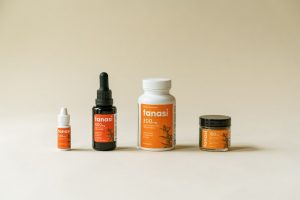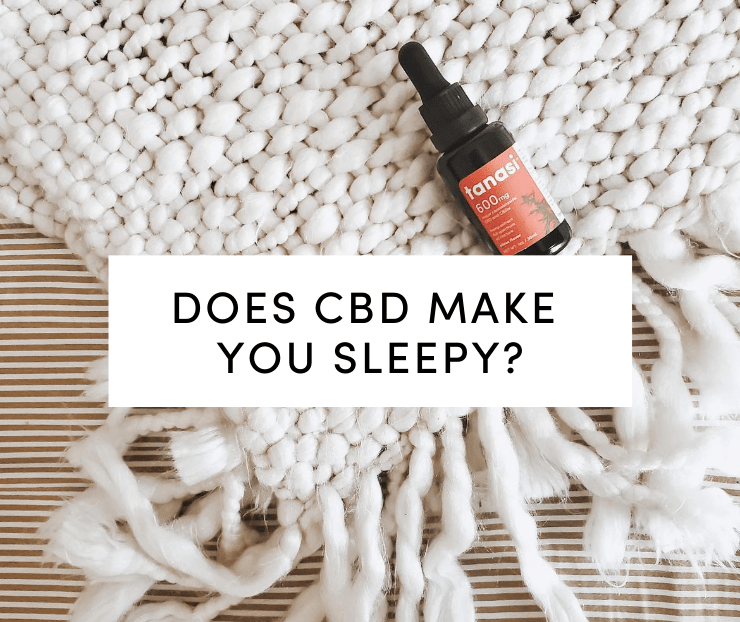Does CBD Make You Sleepy?
Posted on August 12th, 2022
It’s only been a few years since CBD, or cannabidiol, made its debut on the mainstream market, but already, countless CBD shops are cropping up across the country. Since the federal US government legalized CBD in 2018, many people, including scientists, have explored CBD for its ability to transform your body’s health. In fact, CBD has almost eclipsed its psychoactive chemical companion – THC (tetrahydrocannabinol) – thanks to the numerous benefits it appears to offer, all without the fear of getting “high“. With a variety of CBD growers and industry tinkerers, we’re learning there’s still a lot to discover about this cannabis compound. Now, if you’re new to the CBD world, the last thing you want is to get lost in confusion, wondering which product form best suits your needs. That’s why we strive to offer you helpful, informative CBD content on our Tanasi platform. And it’s why, today, we’ll explore the ways in which CBD affects your body, specifically your sleep cycle, and address whether or not CBD can make you sleepy.
What Is CBD?
What exactly is CBD? Cannabidiol can be defined as a naturally occurring compound found in the stem, flowers, and leaves of cannabis plants. Most legal CBD oil is extracted from industrial hemp (a cousin of the marijuana plant), which has less than 0.3% THC concentrations and is therefore not a plant capable of producing psychoactive effects.
What’s the Difference Between CBD and THC?
It would be impossible to talk about CBD oil without mentioning the elephant in the room – THC. Both CBD and THC are prominent cannabinoids in cannabis plants, but the two compounds are quite different. The best way to differentiate CBD from THC is by looking at how both compounds affect you, the user. CBD attaches itself to CB-2 receptors in your cells and throughout your body, outside of your central nervous system. Conversely, THC is more likely to attach itself to CB-1 receptors in your brain. While we’re still working to understand exactly how these cannabinoids affect your body, this difference may help explain why THC is a psychoactive compound, but CBD isn’t.
Does CBD Affect Sleep?
Are you worried that using CBD oil could keep you up at night? Or, are you worried that CBD might make you sleepy? Well, you don’t need to be! In fact, some studies suggest CBD could help manage insomnia. If you’ve considered using CBD oil to help with your sleep problems, you’re in luck!
In many cases, stress-related disorders lead to sleep cycle issues. We don’t have definitive studies linking CBD to better sleep. But many people report that CBD helps patients with PTSD, anxiety, depression, and other stress disorders. Pain can also contribute to sleeplessness, and CBD may help reduce inflammation to deliver pain relief, which could help users sleep better.
 CBD and Sleep Explained
CBD and Sleep Explained
We can assume that CBD delivers a sedative effect. And that it’s similar to what you experience when you use THC. However, CBD does not make you sleepy, even though it may help you battle sleep disorders. That’s because of the unique way in which CBD seems to alleviate symptoms of insomnia.
CBD may help you sleep in two different ways. First, CBD appears to directly interact with the receptors in your brain that dictate your body’s wake and sleep cycle. And second, CBD may help alleviate pain and stress, two factors that can keep you up at night.
The human body has an endocannabinoid system (ECS), a system responsible for receiving cannabinoids. Its receptors are present throughout your brain, tissues, and even your skin. This system controls stress, anxiety levels, and pain perception, working to maintain balance (homeostasis) in your body. The ECS can synthesize phytocannabinoids, which are plant-based cannabinoids. CBD triggers your ECS by activating its receptors to regulate stress, pain, and anxiety. It does this by:
Producing Neurochemicals
CBD appears to attach itself to receptors and connectors that influence the release of melatonin and serotonin both of which are biochemicals that help you maintain a normal sleep cycle.
May Help Loosen Muscles
Muscle conditions like hypermotility, as well as sore, tense muscles, can interfere with sleep. When CBD works with your muscles’ receptors, they might cause a relaxing sensation, leading to better sleep.
Modulating Cortisol
Your body also releases cortisol, a hormone that causes anxiety that can, in turn, interfere with sleep. CBD may help regulate the production of cortisol, which in turn might help the user to fall asleep faster and enjoy better quality sleep.
Minimizing Nightmares
If nightmares give you interrupted nights, you’ll appreciate this study that suggests using CBD may help stop nightmares so you can enjoy better quality slumber.
May Help to Control the Wake/Sleep Cycle
Ever heard of the term somnolence? It refers to being drowsy or having a strong desire to sleep during the day. And somnolence during the day can interfere with your sleep at night. So, if you’re nodding off at the wrong times of the day, taking CBD may help your body’s internal clock get back on track.
Pain Relief
Pain, no matter where you feel it, can be a great hindrance to sleep. CBD might help mitigate this issue by connecting to your cannabinoid receptors. When CBD interacts with your receptors, it can reduce the intensity of pain signals transmitted to your brain. And, once the pain is reduced, you may be able to sleep better.
 Does CBD Affect Sleep Disorders?
Does CBD Affect Sleep Disorders?
Sleep problems come in many different forms, including:
Snoring
Snoring, when severe, can significantly reduce your quality (not to mention the sleep quality of those around you). Sleep is affected when your snoring impacts your breathing by reducing the amount of oxygen in your brain. According to research, CBD shields the brain from the effects of snoring and improves the quality of sleep.
Insomnia
If taken properly, CBD may help combat insomnia for many of the reasons we’ve already reviewed.
What the Research Says About CBD and Sleep
In the last decade, growing interest in the health benefits of CBD has encouraged many researchers and scientists to study its effects. Several studies indicate that high doses of CBD may help support sleep. Here are examples of research studies related to CBD and sleep:
Scott Shannon conducted a study involving 72 subjects. Twenty-five subjects experienced difficulties with sleep, while the remaining 47 patients had anxiety. The study results revealed that in the first month, a 25mg CBD pill ingestion resulted in two changes:
- 79.2% of the subjects said that CBD helped alleviate anxiety
- 66.7% of the subjects said that CBD helped them fall sleep and even gave them a better sleep experience
More Evidence
In another study, compared with a placebo, a 160mg CBD dosage helped increase sleep duration. The research also showed that the placebo, 5mg of nitrazepam (insomnia drug), and 40, 80, 160mg of CBD improved participant’s sleep experience.
In another study of CBD and sleep, researchers recruited 103 subjects who had poor sleep and anxiety. The study aimed to investigate the effects of CBD combined with prescribed medications. The CBD dosage ranged from 25 to 175mg, and it was found that 25mg was the best dosage for anxiety. Troubled sleep, on the other hand, needed a higher dosage. This study concluded that while CBD may help people sleep in the short term, its effects may not be sustained.
Another study published in the journal, Medicines, involved 409 participants with insomnia. They were studied from June 2016 to May 2018. During this period, participants reported their symptoms and rated them on a scale of 1 – 10, with 10 being the worst cases of insomnia. Starting symptoms had an average rating of 6.6. The subjects were treated using cannabis flowers with different intake methods, including pipe, joint, and vape. CBD potency, on average, was 5.7% and limited to 30%. THC potency was, on average, 20% and also limited to 30%. After using the cannabis flower, subjects rated insomnia symptoms, and the average rating was 2.2, which was 4.5 points lower than the starting rating. The results of these findings indicate that cannabinoids may help decrease symptoms of insomnia. But since the study was conducted using cannabis flowers, it’s difficult to determine if the insomnia relief was due to CBD, THC, or other cannabinoids.
What Are the Different Types of CBD and Which Is Best for Sleep?
Full Spectrum CBD
Refers to CBD products that contain all compounds found in hemp plants. That means the product will contain other cannabinoids such as CBN and trace amounts of THC. Full-spectrum CBD oils and other products are popular since the benefits of each component are multiplied when combined (referred to as the entourage effect). Because full-spectrum CBD oils contain THC, they could be spotted during a drug test.
Broad Spectrum CBD
Refers to CBD products with zero THC. Broad-spectrum CBD oil is basically full-spectrum CBD without the THC.
CBD Isolate
Often labeled as “pure CBD” because CBD has been isolated from all other components of the hemp plant.
While the choice is personal, if you’re using CBD for troubled sleep, consider starting with full-spectrum CBD products to maximize the impact of your supplementation.
What Are the Side Effects of CBD?
Typically, CBD oil doesn’t cause many side effects. Most people can enjoy different CBD products without experiencing any side effects. However, a few people do experience the following side effects, typically when taking higher than average doses:
- Drowsiness
- Dry mouth
- Diarrhea
- Fatigue
- Changes in appetite and weight
Other than the mentioned side effects, most research has identified CBD as safe and without side effects.
This guide will answer most of your questions regarding CBD oil and sleep, including if CBD will make you sleepy. Be sure to look at some of our other posts for more information on the effects of CBD oils in your body.

 CBD and Sleep Explained
CBD and Sleep Explained Does CBD Affect Sleep Disorders?
Does CBD Affect Sleep Disorders?

